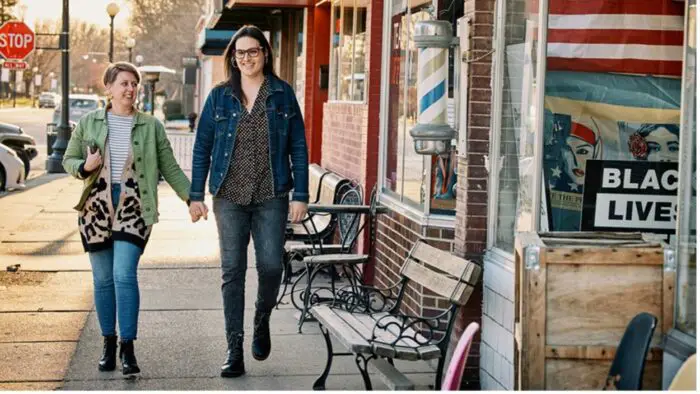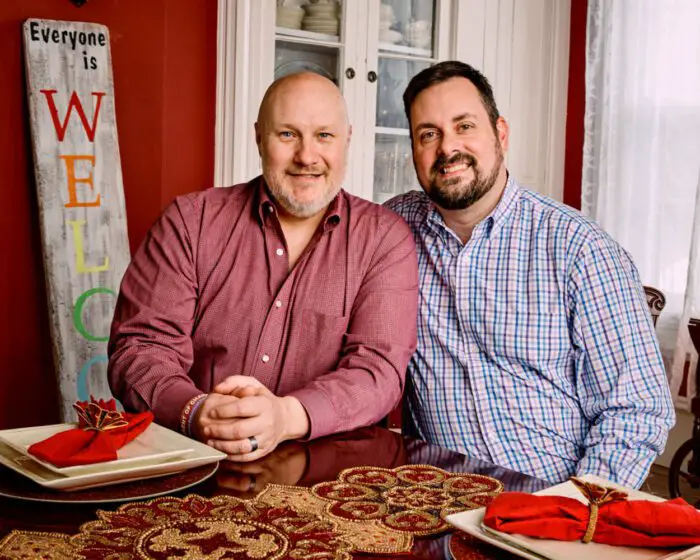We Live Here: The Midwest, the new Hulu Original documentary, makes its case in the most Midwestern of ways: plainly and directly, without fuss or artifice. Profiling, in its short runtime, five LGBTQIA+ couples and their families who love the Midwest but who find living there oppressive, filmmakers Melinda Maerker and David Clayton Miller let each featured subject tell his, her, or their own story, directly to the camera, without intervening much themselves. It’s all too clear that for gay, trans, or queer people, living in the American Midwest in the 21st century has, especially in the last seven years, been made more difficult. Their stories of prejudice and ostracization are compelling enough to bring tears to one’s eyes.
The subjects profiled come from five different Midwestern states and feature a breadth of the complexities faced by LGBTQIA+ people. What they share, aside from the loose thread that links their various identities together as non-normative, is simple: a desire to stay where they are, where they’ve established roots in their communities, their churches, their schools, and their neighborhoods. But a recent, rising tide of discrimination and hate has all of them wondering if they can truly remain in the Midwest, in the homes and with the people they love.
As a married transgender woman living with her wife and their five children, the first of these profiled, Nia, explains, “‘Iowa nice;” is “really just ‘Iowa passive-aggressiveness.'” Nia and Katie live in Des Moines, the state’s capital, one of those few semi-blue larger cities that dot dark-red states like Iowa. Even if it is by a few measures more cosmopolitan, more progressive than its surroundings— which are as conservative as conservative can be— Des Moines has not been entirely hospitable to its LGBTQIA+ people. Nia and Katie have lived there their entire lives, since first meeting in grade school and dating in high school, when Nia lived as a male.

When Nia transitioned not long after their marriage, Katie accepted and encouraged her partner with all the same love and support she always had. Nia’s gender, now changed, did not determine nor sway Katie’s love for her. Theirs is a beautiful, touching story, and the two together are raising five ebullient, charming children. However, Nia’s transition has come with more than one sacrifice. Nia’s family, except for her brother, has disowned her, refusing even simple contact with her; so has Katie’s church, which has bluntly excommunicated her and her family from their congregation. That a Christian woman who can love so fully be punished for standing by her partner and committing to her marriage is, simply, heartbreaking. “I desperately miss the church,” Katie says, breaking into tears.
Across the Midwest, other loving couples find themselves similarly ostracized. In Nebraska, Monte and Mario are a gay Black couple with a young daughter; they too find themselves excommunicated from the church they love for no reason other than the love they share for each other and their infant daughter. In Kansas, lesbian couple Courtney and Denise must homeschool their son Marek to spare him from an incessant bullying the public school blithely ignores.

Elsewhere, the subjects of We Live Here: The Midwest face a unique set of challenges and conflicts if not always overt discrimination. In Ohio, gay teacher Mark risks his livelihood to create a safe space for his deeply appreciative LGBTQIA+ students. In Minnesota, married couple Deb and Jen have both undergone gender transitions and now struggle to rebuild their families. Those are challenges not necessarily unique to trans people—obviously, many children of straight parents also suffer during their parents’ separations or divorces—but Deb and Jen’s children are doubly impacted by their parents’ transitions. The adjustments are complex.
We Live Here: The Midwest concludes with Minnesota State Representative and queer mother Heather Keeler, a married mother and an Indigenous woman who wants to make leadership positions possible for people like her. Keeler’s goal is to LGBTQIA+ and Indigenous rights to the political forefront, but doing so comes at a cost: she tells the filmmakers of the ongoing death threats she’s received for her political action.
Though it is currently presented as a standalone feature documentary, at a runtime of just under an hour and based on the stories of subjects whose lives don’t intersect, except thematically, We Live Here: The Midwest feels a bit like a single episode of a longer docuseries. And indeed, it may turn out to be just that, profiling others with similar challenges across the region or, perhaps, examining the lives of LGBTQIA+ people in the South or on the coasts. Either will be more than welcome.
Nearly immediately after the defeat of Trump in 2020, conservative action groups and lawmakers turned first to anti-Critical Race Theory and then anti-queer legislation across the country, not only in the Midwest, ginning up public sentiment against discussions of race and gender to the point where some states municipalities are working hard to erase black history and eradicate trans people in particular from the public sphere. Would those in support of such efforts take the time to watch a film like We Live Here: The Midwest and strive to know people like Nia, Katie, Monte, Mario, Russ, Mark, Courtney, Denise, Deb, Jan, and those like them in their own communities, they might develop some empathy and understanding.
Sadly, I’m not especially sanguine that will happen. Watching We Live Here: The Midwest feels a bit like a program that might have come from the 1990s, when real progress was first made towards legalizing gay marriage and making communities hospitable for all—and not just for the privileged majority. As good and as earnest as it is in support of LGBTQIA+ people and the issues they face, We Live Here: The Midwest is also a sobering reminder of just how little American society—and midwestern culture in particular—has progressed over the decades.
We Live Here: The Midwest premieres on Hulu December 6, 2023.



